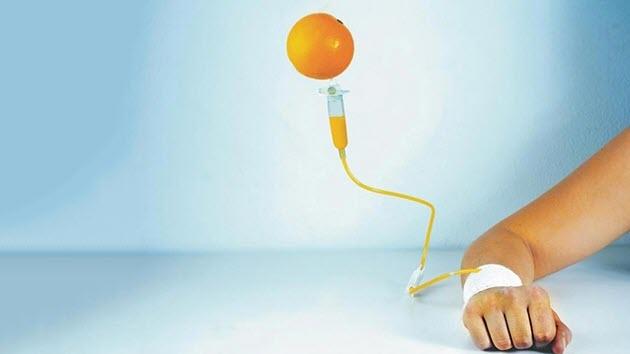For years regulatory agencies like the FDA have subtly targeted the use of such things as intravenous vitamins.
One method they use to target the fabric of culture in
which people utilize simple, naturopathic remedies is the stringent
enforcement of any regulation they can think of. It seems that the FDA
targets regulatory violations supposedly committed by those who deal in
naturopathic medicine far more than violations from Big Pharma.
Almost 10 years ago, in 2011 it was reported that the FDA sent out a warning letter to a small pharmacy, urging them not to stock intravenous vitamin C. In Australia, the mainstream media has consistently inundated the discussion surrounding health with propaganda over the last 10 years, and vitamin C has been specifically scoffed at.
Despite an observable urge for the regulatory agencies to
crush the culture of vitamins and erase their history, it’s leaking out
into the mainstream that intravenous (IV) vitamin C in high doses is
effective against COVID-19.
Now New York’s largest hospital system is using Vitamin C for Covid-19
In New York’s largest hospital system, urgently ill
COVID-19 patients are now being given large doses of IV vitamin C, an
article from the New York Post reported a couple of days ago.
Dr. Andrew G. Weber, a pulmonologist and critical-care specialist affiliated with two Northwell Health facilities on Long Island, said his intensive-care patients with the coronavirus immediately receive 1,500 milligrams of intravenous vitamin C.
Identical amounts of the powerful antioxidant are then readministered three or four times a day, he said.
Each dose is more than 16 times the National Institutes of Health’s daily recommended dietary allowance of vitamin C, which is just 90 milligrams for adult men and 75 milligrams for adult women.
The regimen is based on experimental treatments administered to people with the coronavirus in Shanghai, China, Weber said.
“The patients who received vitamin C did significantly better than those who did not get vitamin C,” he said.
“It helps a tremendous amount, but it is not highlighted because it’s not a sexy drug.” (source)
They say the decision to use IV C in New York was based on
reports of its effectiveness in China, but vitamin C’s reputation in
America far predates that info, although not specifically in response to
this virus.
Intensive-care patients who tested positive for the virus
immediately receive a dose of intravenous vitamin C measuring 1,500
milligrams, says pulmonologist Dr. Andrew G. Weber, a Long Island, New
York critical-care specialist affiliated with two Northwell Health
facilities in the area.
Up to 4 times a day, the same dose is re-administered. It
was not specified what form of IV C was used, but it is likely to be
either Ascorbic Acid (what you typically buy at the store) or Sodium
Ascorbate (a popular form intended to be easier on the stomach or the body’s acidity).
Some vitamins, originally derived from the phrase “vital
amines,” have different, beneficial effects at much higher doses. At the
same time, some minerals or vitamins can throw bodily processes into a
state of imbalance with doses too high.
Vitamin C seems to be one of those vitamins that is potent and extremely beneficial at high doses.
Vitamin C is being “widely used” to treat this virus “throughout the system,” a spokesman for Northwell confirmed, the institution that operates 23 hospitals including Lenox Hill Hospital in Manhattan.
This may be a better choice than the more pharmaceutical option.
On a different note, a pharmaceutical combination
consisting of malaria drugs known for horrific side-effects, mixed with
antibiotics that are known to have no ability to kill viruses (hydroxychloroquine and azithromycin) was promoted by Donald Trump recently.
Nevada recently banned the
use of hydroxychloroquine and chloroquine to treat the virus. For
someone who believes in freedom, any sort of ban would seem like a step
in the wrong direction, but the side effects of hydroxychloroquine and
related compounds are well documented.
This 2018 paper published
in the Journal of Thoracic Disease examined “HCQ-induced
cardiotoxicity,” and heart failure in twins born to a mother who took
the drug.
Another paper published in
the European Heart Journal of Acute Cardiovascular Care said
cardiotoxicity is a “rare but serious complication of
hydroxychloroquine.”
Not only that but as of March
24, some kind of federal permission was granted to New York hospitals
to dose patients with a “cocktail” of hydroxychloroquine and
azithromycin to patients who were considered desperately ill, “on a
‘compassionate care’ basis.”
Hopefully, this compassionate care mentality can be
directed toward the firm belief in voluntary treatment, of whatever a
hospital has, wherever in the world the person is, rather than
involuntary treatment with whatever a hospital chooses to give.
NY is ahead of the curve
In contrast to what is happening in other places, the NY Post reported the Vitamin C is being “administered in addition to such medicines as the anti-malaria drug hydroxychloroquine, the antibiotic azithromycin, various biologics, and blood thinners.”So why Vitamin C?
Weber, 34, said vitamin C levels in coronavirus patients drop dramatically when they suffer sepsis, an inflammatory response that occurs when their bodies overreact to the infection.https://www.zerohedge.com/health/iv-vitamin-c-widely-used-treat-covid-19-ny-hospitals
“It makes all the sense in the world to try and maintain this level of vitamin C,” he said.
A clinical trial on the effectiveness of intravenous vitamin C on coronavirus patients began Feb. 14 at Zhongnan Hospital in Wuhan, China, the epicenter of the pandemic. (source)

No comments:
Post a Comment
Note: Only a member of this blog may post a comment.